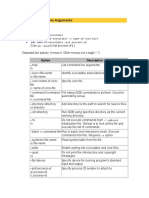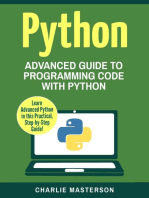PDB Commands PDF
Uploaded by
Shaik NisarPDB Commands PDF
Uploaded by
Shaik NisarPdb Commands
Physics 91SI, Spring 2013
Rex Garland and Gabe Ehrlich
Startup and Help
python -m pdb <name>.py[args] begin the debugger
help [command] view a list of commands, or view help for a specific
command
within a python file:
import pdb
...
pdb.set_trace() begin the debugger at this line when the file is run
normally
Navigating Code (within the Pdb interpreter)
l(ist) list 11 lines surrounding the current line
w(here) display the file and line number of the current line
n(ext) execute the current line
s(tep) step into functions called at the current line
r(eturn) execute until the current function’s return is
encountered
Controlling Execution
b [#] create a breakpoint at line [#]
b list breakpoints and their indices
c(ontinue) execute until a breakpoint is encountered
clear[#] clear breakpoint of index [#]
Changing Variables / Interacting with Code
p <name> print value of the variable <name>
!<expr> execute the expression <expr>
NOTE: this acts just like a python interpreter
run [args] restart the debugger with sys.argv arguments [args]
q(uit) exit the debugger
You might also like
- Python Debugger Cheatsheet: Getting Started MovementNo ratings yetPython Debugger Cheatsheet: Getting Started Movement1 page
- GDB Command Line Arguments:: Option DescriptionNo ratings yetGDB Command Line Arguments:: Option Description6 pages
- Unix Operating System: 1 STC TechnologiesNo ratings yetUnix Operating System: 1 STC Technologies29 pages
- (SEM III) (AKTU) PYTHON THEORY EXAMINATION 2022-23 SOLUTIONNo ratings yet(SEM III) (AKTU) PYTHON THEORY EXAMINATION 2022-23 SOLUTION17 pages
- Python: Advanced Guide to Programming Code with Python: Python Computer Programming, #4From EverandPython: Advanced Guide to Programming Code with Python: Python Computer Programming, #4No ratings yet
- UNIX Shell Programming Interview Questions You'll Most Likely Be AskedFrom EverandUNIX Shell Programming Interview Questions You'll Most Likely Be AskedNo ratings yet
- Session Summary CRISP Data Mining: Business UnderstandingNo ratings yetSession Summary CRISP Data Mining: Business Understanding4 pages
































































